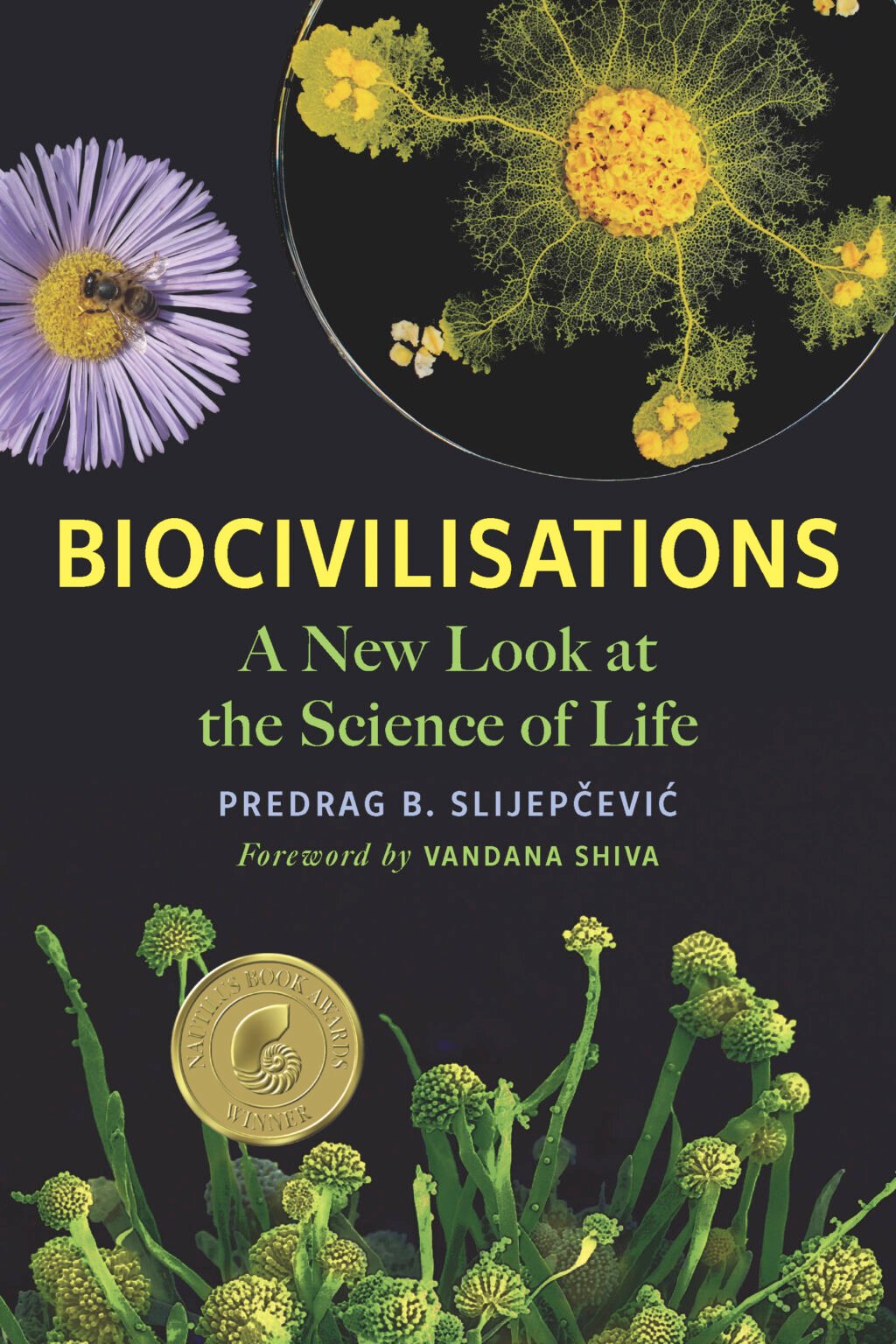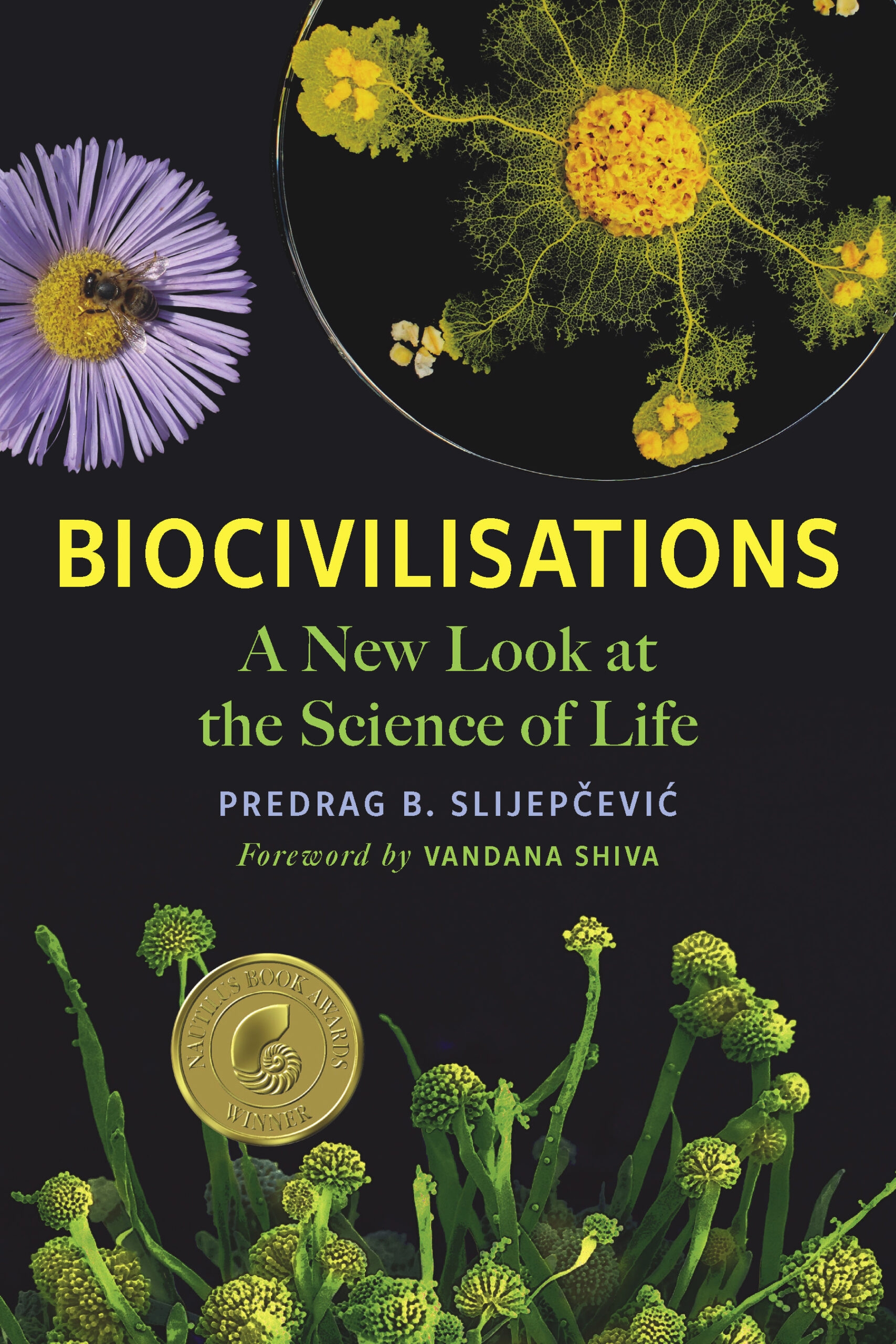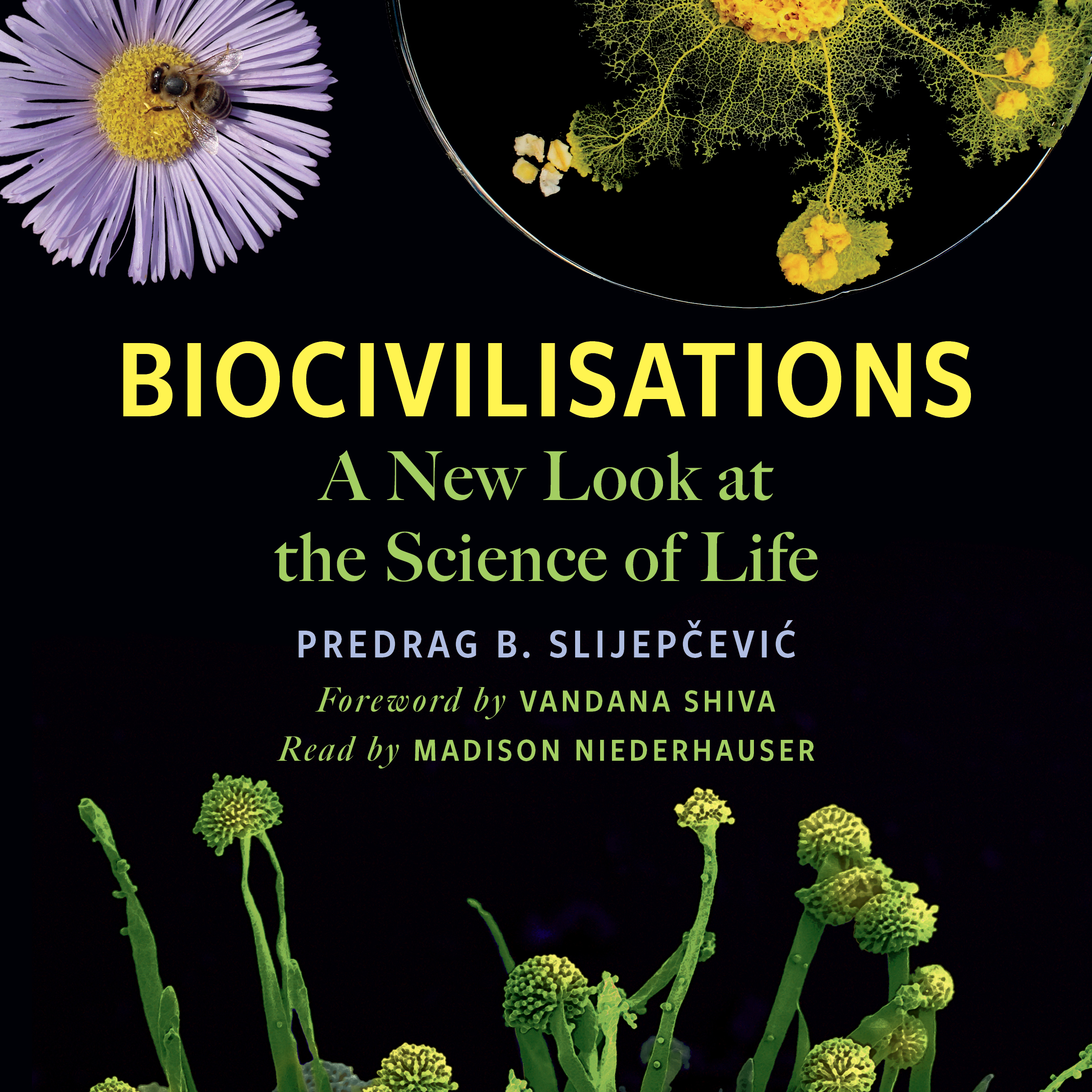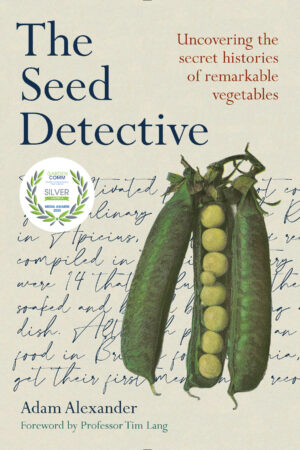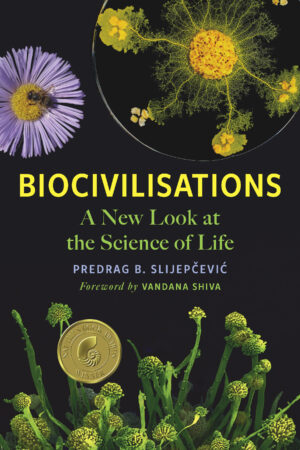| Pages: | 272 pages |
| Book Art: | Black-and-white photographs and illustrations throughout |
| Size: | 6 x 9 inch |
| Publisher: | Chelsea Green Publishing UK |
| Pub. Date: | May 18, 2023 |
| ISBN: | 9781645021384 |
Also available in:
Biocivilisations
A New Look at the Science of Life
“A brilliant book [that] shows a way out of the destructive trap of Anthropocentric arrogance.”—Vandana Shiva, author of Terra Viva
“An unusually thought-provoking and ambitious book.”—Dr. James A. Shapiro, author of Evolution: A View from the 21st Century
Biocivilisations is an important, original rethinking of the mystery of life and its deep uncertainty, exploring the complex civilisations that existed on Earth long before humans.
What is life? Many scientists believe life can be reduced to ‘mechanistic’ factors, such as genes and information codes. Yet there is a growing army of scientists, philosophers and artists who reject this view. The gene metaphor is not only too simplistic but deeply misleading. If there is a way to reduce life to a single principle, that principle must acknowledge the creativity of life, turning genetic determinism on its head.
The term biocivilisations is the acknowledgement of this uncertainty of life, as opposed to a quasi-certainty of the human position governed by a narrow time window of the scientific revolution. Life existed without humans for more than 99.99 percent of the Earth’s existence. Life will also continue without humans long after our inevitable extinction.
In Biocivilisations, Dr Predrag Slijepčević shows how bacteria, amoebas, plants, insects, birds, whales, elephants and countless other species not only preceded human beings but demonstrate elements of how we celebrate human civilisation – complex communication, agriculture, science, art, medicine and more.
Humans must try to adopt this wisdom from other biocivilisations that have long preceded our own. By rethinking the current scientific paradigm, Dr Slijepčević makes clear that a transformation – from a naïve young species into a more mature species in tune with its surroundings – will save us from our own violence and the violence we inflict on the rest of our living planet.
“Read this book if you would like to understand the intelligence of living systems.”—Dr Denis Noble, University of Oxford
Reviews and Praise
'A prodigious synthesis and a great, ambitious and informative book dovetailing multiple fields in its effort – largely successful I think – to light a match – and then blow on the fires of the coming "Copernican biological revolution."'
Dorion Sagan
More Reviews and Praise
'Read this book if you would like to understand the intelligence of living systems. Civilisation did not just start with Homo sapiens. Life cannot be reduced to pure mechanism.'
Dr Denis Noble, Emeritus Professor of Cardiovascular Physiology, University of Oxford; Fellow of the Royal Society; 2022 Lomonosov Grand Gold Medal laureate
'In Biocivilisations, Predrag Slijepčević tells stories about animals that create art, insects that do battlefield surgery, trees that perform scientific research, bacteria that create intelligent networks, and whole ecosystems that are organized with an efficiency that surpasses any human supply chain. Maybe you thought humans were the crown of creation. Maybe we humans have to learn humility and respect for the biosphere that birthed us. Maybe our future depends on it.'
Josh Mitteldorf, PhD, coauthor of Cracking the Aging Code
'Predrag Slijepčević’s Biocivilisations: A New Look at the Science of Life offers a powerful and welcome synthesis of what we ought by now to be happy to call Gaian science. It brings together crucial developments in biological systems thinking – such as symbiogenesis, epigenetics, biosemiotics, Gaia theory and autopoiesis – under a comprehensive vision founded on the cosmological longevity and cognitive acumen of the bacterial microcosm and its planetary offspring: multicellular life in all of its forms and alliances. Biocivilisations vigorously dismantles modern strains of scientific and cultural anthropocentrism and their current avatars peddling the futurist delusions of Singularity buffs and AI transhumanists. Slijepčević’s presentation of these crucial and heady matters is properly technical but consistently readable and deeply documented. His approach to science participates in a poetic spirit he perceives everywhere in a terrestrial biosphere that has risen for over four billion years to collective, eventually cross-kingdom consortia such as the ‘Wood Wide Web’ revealed by the new forest ecology. The environmental constructions of such biocivilisations long precede the human elaboration of its own technosphere. I highly recommend Slijepčević’s Biocivilisations for those who would like to get effectively up to speed on the most cogent contemporary challenges to the physicalist-mechanistic technoscientific mainstream.'
Bruce Clarke, Paul Whitfield Horn Distinguished Professor of Literature and Science, Texas Tech University, Baruch S. Blumberg NASA/Library of Congress Chair in Astrobiology
‘Biocivilizations is an unusually thought-provoking and ambitious book. It challenges the reader to abandon several centuries of assumptions about how to describe the living world in purely physical and mechanistic terms, a world governed by an evolutionary process that places human beings at the apex.’
Dr. James A. Shapiro, author of Evolution: A View from the 21st Century
'Sentience, cognition and intelligence are emerging as inherent faculties of all life which has evolved on the Earth. Most of these living systems are much older than humanity and obviously are well integrated to support life. In Biocivilisations, Predrag Slijepčević makes clear that the sentient life is essential for the habitability of our planet and that humans should step down from the so-called crown of evolution model in order to appreciate our true position within the complex network of life. Only then will our civilization improve its rather doomed prospects for survival.'
Dr František Baluška, Institute of Cellular and Molecular Biology, University of Bonn
"Constructed with care, [Slijepčević's] arguments integrate hundreds of examples from the natural world . . . The prose is solid, impassioned, and informed. . . . [and] by defying entrenched and arrogant assumptions about human superiority, the book shows that people have much to learn from creatures like ants and bacteria."
Foreword Reviews
"Exceptionally well written, organized and presented, and as fascinating as it is informative, thoughtful, and thought-provoking, "Biocivilisations: A New Look at the Science of Life" will have a very special appeal and relevance to readers with an interest in bacteriology, microbiology, evolution, nature and ecology."
Midwest Book Review
Reviews and Praise
'A prodigious synthesis and a great, ambitious and informative book dovetailing multiple fields in its effort – largely successful I think – to light a match – and then blow on the fires of the coming "Copernican biological revolution."'
Dorion Sagan
'Read this book if you would like to understand the intelligence of living systems. Civilisation did not just start with Homo sapiens. Life cannot be reduced to pure mechanism.'
Dr Denis Noble, Emeritus Professor of Cardiovascular Physiology, University of Oxford; Fellow of the Royal Society; 2022 Lomonosov Grand Gold Medal laureate
'In Biocivilisations, Predrag Slijepčević tells stories about animals that create art, insects that do battlefield surgery, trees that perform scientific research, bacteria that create intelligent networks, and whole ecosystems that are organized with an efficiency that surpasses any human supply chain. Maybe you thought humans were the crown of creation. Maybe we humans have to learn humility and respect for the biosphere that birthed us. Maybe our future depends on it.'
Josh Mitteldorf, PhD, coauthor of Cracking the Aging Code
'Predrag Slijepčević’s Biocivilisations: A New Look at the Science of Life offers a powerful and welcome synthesis of what we ought by now to be happy to call Gaian science. It brings together crucial developments in biological systems thinking – such as symbiogenesis, epigenetics, biosemiotics, Gaia theory and autopoiesis – under a comprehensive vision founded on the cosmological longevity and cognitive acumen of the bacterial microcosm and its planetary offspring: multicellular life in all of its forms and alliances. Biocivilisations vigorously dismantles modern strains of scientific and cultural anthropocentrism and their current avatars peddling the futurist delusions of Singularity buffs and AI transhumanists. Slijepčević’s presentation of these crucial and heady matters is properly technical but consistently readable and deeply documented. His approach to science participates in a poetic spirit he perceives everywhere in a terrestrial biosphere that has risen for over four billion years to collective, eventually cross-kingdom consortia such as the ‘Wood Wide Web’ revealed by the new forest ecology. The environmental constructions of such biocivilisations long precede the human elaboration of its own technosphere. I highly recommend Slijepčević’s Biocivilisations for those who would like to get effectively up to speed on the most cogent contemporary challenges to the physicalist-mechanistic technoscientific mainstream.'
Bruce Clarke, Paul Whitfield Horn Distinguished Professor of Literature and Science, Texas Tech University, Baruch S. Blumberg NASA/Library of Congress Chair in Astrobiology
‘Biocivilizations is an unusually thought-provoking and ambitious book. It challenges the reader to abandon several centuries of assumptions about how to describe the living world in purely physical and mechanistic terms, a world governed by an evolutionary process that places human beings at the apex.’
Dr. James A. Shapiro, author of Evolution: A View from the 21st Century
'Sentience, cognition and intelligence are emerging as inherent faculties of all life which has evolved on the Earth. Most of these living systems are much older than humanity and obviously are well integrated to support life. In Biocivilisations, Predrag Slijepčević makes clear that the sentient life is essential for the habitability of our planet and that humans should step down from the so-called crown of evolution model in order to appreciate our true position within the complex network of life. Only then will our civilization improve its rather doomed prospects for survival.'
Dr František Baluška, Institute of Cellular and Molecular Biology, University of Bonn
"Constructed with care, [Slijepčević's] arguments integrate hundreds of examples from the natural world . . . The prose is solid, impassioned, and informed. . . . [and] by defying entrenched and arrogant assumptions about human superiority, the book shows that people have much to learn from creatures like ants and bacteria."
Foreword Reviews
"Exceptionally well written, organized and presented, and as fascinating as it is informative, thoughtful, and thought-provoking, "Biocivilisations: A New Look at the Science of Life" will have a very special appeal and relevance to readers with an interest in bacteriology, microbiology, evolution, nature and ecology."
Midwest Book Review


